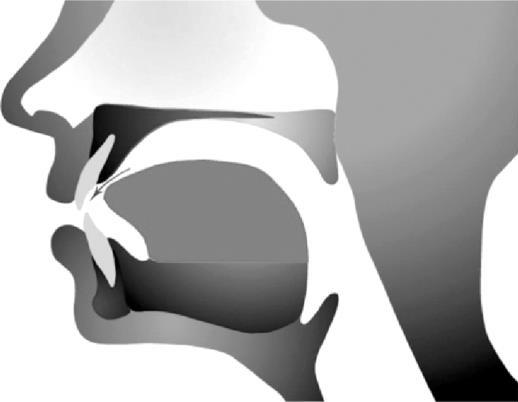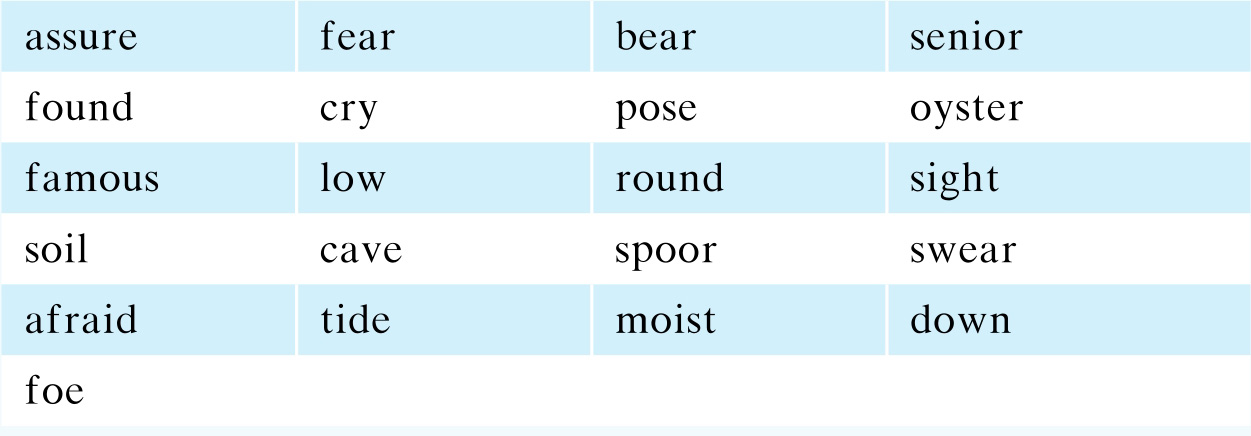





双元音发音时应注意以下几点:
(1)发音时由一元音向另一元音 滑动 ,发音过程中 口型一定有变化 。
(2)前 重 后 轻 ,第一部分发音较 响亮 ,第二部分发音较 轻弱 。
(3)前 长 后 短 ,第一部分发音较 悠长 ,第二部分发音较 短促 。
(4)双元音发音不饱满有误差时,如何纠正? 用斯密老师独创的“慢速分离”:拉长发音,分离首元音与尾元音,先一分为二,再合二为一。

same David rain
 1-16
1-16
由 /e/ 向 /ɪ/ 滑动,发音过程中 下颚向上合拢 ,舌位也随之 稍稍抬高 。

· play a good game at chess
· face the world and brave the storm
· rain cape
· pave the way
· Success came after many failures.
· day by day
· It's pay day today.
· make a face
· The plane will take off at eight.
· His name is David.
· No pains, no gains.
· He is having a conversation with a stranger.
· It takes hard work to make the grade in school.
· Great changes have taken place in only a few days.
· They painted the table at the gate pale grey the other day.
· He became famous in the late 1980s.
· Can you stay and play another game?
· The lazy cat lay in the shade of the apple tree all day.
· Call a spade a spade.
· It's a shame they don't get paid on the train.

wire time fry
 1-17
1-17
此音由 /ɑː/ 向 /ɪ/ 滑动, /ɑː/ 是前元音,和汉字 “啊” 相似,但舌位更 靠前 ,发音 清晰 ,持续时间 稍长 。
后元音 /ɪ/ 发得 短促含糊 。

· I drive five miles with Mike every Friday night.
· I would like to buy my ties before the price begins to rise.
· It's the right time to find a gold mine in the wild.
· Great minds think alike.
· The kite is flying high in the sky.

boy voice join
 1-18
1-18
由 /ɒ/ 向 /ɪ/ 滑动,第一部分发音 较清晰 ,持续时间 较长 ;第二部分发音 较模糊短促 ,发音时双唇 由圆变扁 ,口型 由开到合 。

· Did you enjoy your voyage in Europe?
· I enjoy the boy's voice.
· I am annoyed at the boy for spoiling the toy.
· Boil the fish, then broil it without any oil.
· One man's meat is another man's poison.
· Spare the rod, spoil the child.
· It's annoying when their voice turn to noise, and try to avoid flipping a coin.

oh Joe blow
 1-19
1-19
发音时由 /ə/ 出发,向 /ʊ/ 滑动,双唇 收小收圆 ,第一部分 发音稍长 ,滑动过程 稍短 。

· Go and open the window.
· Slowly the ocean rolled toward the row of homes.
· The roses won't grow even slowly in this cold weather.
· He was bloated after eating a roast and a tomato.
· Man proposes, God disposes.
· A rolling stone gathers no moss.

down count sound
 1-20
1-20
发音时由 /ɑː/ 出发,向 /ʊ/ 滑动,双唇 逐渐收圆收拢 ,注意 将音发足 ,避免 一开始就把双唇收圆 。美式英语 由/æ/出发,向/ʊ/滑动,口型变化幅度更大,音色更夸张 。

· They found it around the house.
· He counted the hours and vowed to get out of the house.
· We have found a roundabout without any doubt.
· The sow, the mouse and the cow sounded a rousing song.
· Sound in body, sound in mind.
· She is out of town every now and then.

here hear b eer
 1-21
1-21
发音时由 /ɪ/ 出发,向 /ə/ 滑动,发 /ɪ/ 时注意 用扁平唇 ,迅速由 /ɪ/ 滑向 /ə/ 。后音节请不要找替代音/əu/。注意美式英语里 /ɪə/不一定会卷舌,要看它后面有没有字母r 。

· See, the end of the pier is near, I fear.
· My dear deer drinks beer.
· The earrings fell down to the nearby pool.
· A beer glass appeared near the rear window.
· I fear we can't hear him clearly.
· You are serious but sincere, my dear.

there share hair
 1-22
1-22
发音时由 /e/ 出发,向 /ə/ 滑动,舌尖 下垂 ,开口程度 稍小 。注意这个元音 本身是不卷舌的 。

· That's a rare pair of shoes for a female to wear.
· A careful mayor wants to repair his chair with the bear.
· An air of excitement rarely blares down the stairs.
· This affair is unfair compared to that one.
· How did you fare there?
· It is over there on the chair.

sure poor
 1-23
1-23
发音时由 /ʊ/ 出发,向 /ə/ 滑动,滑动过程中口型 由圆形变为半开唇 ,注意 /ʊ/不要发成/uː/或者汉字“勿” 。

· I'm pretty sure this is newer and purer.
· Are you sure you can endure such a long tour?
· Poor hunters offer no allure to sure shots.
· The pure girl buys the jewel on the tour.
· A poor man is looking for his pure gold.
· I will tour this European country as usual.
 1-24
1-24
1. 读单词

2. 读句子
(1)The old goat can no longer walk.
(2)They will offer help as they said.
(3)I'm sure the poor farmer is curious about this tour.
(4)The air in this area is bad, so just take care of your sick grandmother.
(5)There is too much noise. How about you try it in the toilet?
Checkpoint Diphthong Sounds双元音,看你会不会?
A Which word sounds different? 哪个词发音不一样?
1. ( ) a. will ow b. h ow c. s oa k
2. ( ) a. h or se b. h ou se c. t ow n
3. ( ) a. y e llow b. forg e t c. m a ke
4. ( ) a. c a stle b. t y pe c. c ar pet
5. ( ) a. bl ou se b. c or e c. st al l
6. ( ) a. c o ld b. r oa d c. s or e
7. ( ) a. s ou p b. kn ow c. tr oo p
B Sort them out !按音素分类!

/eɪ/ /aɪ/
/ɔɪ/ /əu/
/aʊ/ /ɪə/
/eə/ /ʊə/